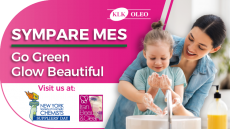Eco boost: Five recent developments in sustainable beauty across APAC
![Our top five most-read stories on sustainability. [Getty Images]](/var/wrbm_gb_food_pharma/storage/images/_aliases/wrbm_large/publications/cosmetics/cosmeticsdesign-asia.com/headlines/market-trends/eco-boost-five-recent-developments-in-sustainable-beauty-across-apac8/12990495-1-eng-GB/Eco-boost-Five-recent-developments-in-sustainable-beauty-across-APAC.jpg)
1 – WATCH – Beyond the soap bar: Forestwise, NueBar and Coconut Matter on what it will take for solid beauty to flourish
On this episode of the Beauty Broadcast, we explore the growing popularity of solid beauty products and discuss what it will take to solidify the mainstream adoption of this eco-friendly product format with experts from Forestwise, Nuebar and Coconut Matter.
Personal care has come a long way since the humble soap bar. Today, a number of solid products are emerging in categories from shampoos to serums as consumers rediscover the solid format in the name of minimalism and sustainability.
“The opportunities for growth are actually really huge. I think there's increasing awareness about the problem of plastic and the fact that recycling really isn't a solution. I think that as awareness builds and builds, I think people are looking for ways to do something about it, I'd really like to see this become like the new normal,” said Katie Hennah, the founder of Aussie solid beauty brand NueBar.
Solid beauty products are touted for their ability to reduce water consumption, transportation costs, and packaging altogether.
2 – Powder power: Singapore start-up to launch eco-conscious hair care brand with waterless shampoos
A Singapore-based start-up is set to launch a range of waterless shampoos to tackle the issue of plastic waste and water scarcity in 2022 after delays brought about by COVID-19.
The Powder Shampoo was established this year by CEO Lynn Tan, a veteran in the hair care industry who has established a successful beauty distribution business in Asia over the past two decades.
She was also the former managing director of Ales Groupe Singapore, the company behind Phyto Haircare and Lierac Skincare.
“In recent years, I’ve become more aware of the facts and figures on climate change. The more I read, the more I knew, the more it bothered me. I started to question the role I play in the ecosystem as a distributor, if I have been part of the problem for the past twenty years?” she said.
3 – ‘Create lasting value’: NZ’s Emma Lewisham aiming to cut product carbon footprint ‘close to zero’ by 2030
Emma Lewisham has laid out targets to reduce its product carbon footprint as “close to zero as possible” by 2030 after achieving its goal of becoming a carbon positive beauty brand with a 100% circular designed business model.
The Kiwi brand was established in 2019 by CEO Emma Lewisham, who set out to develop a circular beauty brand that kept its resources in circulation to eliminate waste and reduce its carbon footprint in an industry that generates 120 billion units of waste every year.
On September 29, the brand announced that had achieved its goal of becoming a carbon positive beauty brand within the timeline it set for itself.
Over the last 12 months, the company worked with an independent environmental certification agency Toitū Envirocare.
4 – Shroom protection: Mushroom Material targets cosmetics sector with sustainable alternative to styrofoam and cardboard packaging
New Zealand start-up Mushroom Material has developed a sustainable mushroom-based material as an alternative to polystyrene styrofoam and cardboard packaging and is targeting the cosmetics sector for its first products.
Made from the vegetative part of mushrooms called mycelium and fibrous agricultural waste, the material is robust enough to withstand impacts, yet biodegradable within six weeks.
Suitable for products from cosmetics to cutlery, the packaging is customisable to any shape, size and surface finish, is stronger than concrete pound for pound, has a better thermal insulator than fibreglass, is odourless, mould resistant and non-toxic.
The company was founded by Shaun Seaman in 2020 after observing the huge amounts of waste material produced globally.
5 – ‘Give more than we take’: Indian D2C brand Pilgrim pledges to become plastic positive beauty brand
Indian clean beauty brand Pilgrim has announced a new partnership that will help it achieve its goal of becoming a company with a positive net impact on the environment in terms of plastic footprint.
Pilgrim is a direct-to-consumer beauty and personal care brand launched in 2020 founded by Anurag Kedia and Gagandeep Makker. The clean beauty brand offers a range of beauty products inspired by global beauty traditions such as Korean and French beauty rituals.
The 100% cruelty-free and vegan brand recently announced that it would be furthering its commitment to be a clean beauty brand by increasing efforts to minimise its environmental impact, especially regarding its plastic consumption.
“We are all driven by the idea of constant innovation and are working to ensure that we deliver the most innovative and sustainable products and packaging. Our goal as a brand is to further move up the bar of sustainability and to give more than we take from this earth,” said Makker.
![A.S. Watson co-created a skin care brand with Procter & Gamble that aligns with its Sustainable Choices product range.[A.S. Watson / P&G]](/var/wrbm_gb_food_pharma/storage/images/_aliases/wrbm_medium/publications/cosmetics/cosmeticsdesign-asia.com/headlines/brand-innovation/a.s.-watson-sees-p-g-collaboration-as-opportunity-to-expand-sustainable-beauty-offerings/13091000-1-eng-GB/A.S.-Watson-sees-P-G-collaboration-as-opportunity-to-expand-sustainable-beauty-offerings.jpg)
![Kao reports Q3 sales decline in skin care as the demand for hand soaps and sanitisers tumbled. [Kao Corp / Curél]](/var/wrbm_gb_food_pharma/storage/images/_aliases/wrbm_medium/publications/cosmetics/cosmeticsdesign-asia.com/headlines/business-financial/kao-reports-q3-skin-care-sales-dip-as-hand-hygiene-demand-falls/12995611-1-eng-GB/Kao-reports-Q3-skin-care-sales-dip-as-hand-hygiene-demand-falls.jpg)
![Ecostore has underlined the global eco-initiatives it will be focusing on next year. [ecostore]](/var/wrbm_gb_food_pharma/storage/images/_aliases/wrbm_medium/publications/cosmetics/cosmeticsdesign-asia.com/article/2021/11/03/nz-s-ecostore-highlights-global-eco-initiatives-it-will-undertake-in-2022/12944597-6-eng-GB/NZ-s-Ecostore-highlights-global-eco-initiatives-it-will-undertake-in-2022.jpg)
![Register now for a free webinar on circular beauty innovation. [Getty Images]](/var/wrbm_gb_food_pharma/storage/images/_aliases/wrbm_medium/publications/cosmetics/cosmeticsdesign-asia.com/headlines/market-trends/circular-beauty-how-beauty-is-accelerating-the-transition-in-the-post-pandemic-era/12979272-1-eng-GB/Circular-beauty-How-beauty-is-accelerating-the-transition-in-the-post-pandemic-era.jpg)





![Indus Valley is working to corner 30% of India's online premium boxed hair colour market. [Indus Valley]](/var/wrbm_gb_food_pharma/storage/images/_aliases/wrbm_tiny/publications/cosmetics/cosmeticsdesign-asia.com/article/2024/07/26/indus-valley-aims-to-secure-30-of-india-s-online-premium-hair-colour-market-with-organic-offerings/17594932-5-eng-GB/Indus-Valley-aims-to-secure-30-of-India-s-online-premium-hair-colour-market-with-organic-offerings.jpg)
![[Getty Images]](/var/wrbm_gb_food_pharma/storage/images/_aliases/wrbm_tiny/publications/cosmetics/cosmeticsdesign-asia.com/china/china-focus-latest-developments-in-china-s-booming-beauty-market25/17606695-1-eng-GB/China-focus-Latest-developments-in-China-s-booming-beauty-market.jpg)
![Kosé has launched makeup brand Visée in Singapore as part of plans to reinforce its position in SEA. [Visée]](/var/wrbm_gb_food_pharma/storage/images/_aliases/wrbm_tiny/publications/cosmetics/cosmeticsdesign-asia.com/headlines/business-financial/visee-singapore-kose-aims-to-enhance-brand-visibility-in-sea-with-new-launch/17587264-1-eng-GB/Visee-Singapore-Kose-aims-to-enhance-brand-visibility-in-SEA-with-new-launch.jpg)
![ble C&C is set on reinforcing its competitiveness in China’s beauty market. [Missha]](/var/wrbm_gb_food_pharma/storage/images/_aliases/wrbm_tiny/publications/cosmetics/cosmeticsdesign-asia.com/headlines/business-financial/able-c-c-aims-to-strengthen-competitiveness-in-china-through-online-expansion-kol-collabs/17591626-1-eng-GB/Able-C-C-aims-to-strengthen-competitiveness-in-China-through-online-expansion-KOL-collabs.jpg)

![LG H&H genetic study says 23 genetic regions affect natural skin tone. [Getty Images]](/var/wrbm_gb_food_pharma/storage/images/_aliases/wrbm_tiny/publications/cosmetics/cosmeticsdesign-asia.com/article/2024/07/23/lg-h-h-discovery-of-genetic-skin-tone-factors-in-east-asians-potentially-key-to-skin-radiance-developments/17587210-1-eng-GB/LG-H-H-discovery-of-genetic-skin-tone-factors-in-East-Asians-potentially-key-to-skin-radiance-developments.jpg)

![DR.CI:LABO expects brand-supplier partnerships gain more public prominence as consumers interest in skin care grows online. [Dr.Ci:Labo]](/var/wrbm_gb_food_pharma/storage/images/_aliases/wrbm_tiny/publications/cosmetics/cosmeticsdesign-asia.com/article/2024/07/22/brand-supplier-partnerships-will-come-to-the-fore-amid-the-online-skin-care-landscape-dr.ci-labo/17576755-1-eng-GB/Brand-supplier-partnerships-will-come-to-the-fore-amid-the-online-skin-care-landscape-DR.CI-LABO.png)


